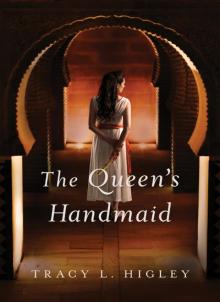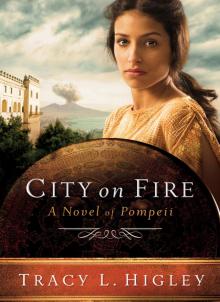- Home
- Tracy L. Higley
Keeper of the Flame Page 7
Keeper of the Flame Read online
Page 7
She turned to the general at her side, whose admiration as he watched her, warmed her to her depths. She raised an arm in salute, and called out in a strong and full voice. “Hail, Caesar!”
There was only a moment’s pause, and then the people responded, as she knew they would.
“Hail, Caesar!”
Triumph curled into a small smile, and she held her arm still upraised.
But in the roar of approval that followed, the voice that hounded her through all of her decisions would not cease its dark whispering: You are committed now. For better or worse. And when it is all over, will Egypt still be yours? Or have you just sold yourself to Rome?
Nine
It was dark when Sophia decided that the rotating Roman guard that paced across the palace courtyard had sufficiently thinned. They were watchful for angry mobs, but one woman who knew every inch of the palace could easily go unseen.
From the steps that led from the harbor, she crept along the garden wall until she reached the juncture where the wall met the palace. Here, a small door provided a quick exit for gardeners tending to the plants and flowers outside the official gardens. She had to bend to enter, so small was the opening. In the cobwebby darkness beyond, she squeaked the door closed, then eased upright. Silent as a tomb and just as dark. But Sophia and Cleopatra had often come this way when the queen was a child. Now Sophia moved forward, grateful to be on sure footing.
The corridor shot straight through the lowest level of the palace, and within minutes she emerged into the inner courtyard garden.
The sun had dropped below the palace walls, leaving her in blessed shadow. Only one soldier seemed about, beside the main entrance. He rolled his shoulders as though he had stood too long.
Sophia slipped along the inner wall, into another corridor that branched through the palace. A few yards down, and stone steps brought her to the throne room level.
Where are you, Cleopatra?
Would she find the queen alone, where she could entreat her to secure the release of Sosigenes? Or would Cleo be with him, the Roman who had imprisoned the scholar so unjustly?
She slipped along the chambered hall, peering into each room she passed.
She thought again of her rooms in the lighthouse. She would be lighting the lamps now if she were there. Settling down for the evening with some scrolls of Plato, or perhaps Zeno of Citium. A wave of anger at those who had forced her from comfort pulsed through her chest.
She heard chanting from the throne room ahead. Though it had only a modest squared entryway, the room opened into a grand columned hall, with carved reliefs and painted frescoes in the classic Egyptian style. The Greeks had always acted so in Egypt. Part flattery of imitation and part diplomacy and placating, they continued the styles of architecture and even religion that they had found when Alexander first arrived in Egypt three hundred years ago.
The throne room had no windows. Cleopatra’s father had built it to control the amount of light at any time of day.
With the night spreading up the corridor behind her and only a few lamps lit in the hall ahead, Sophia at first saw nothing but the dancing flames when she approached the doorway.
Several figures soon revealed themselves in the darkness. Cleopatra and her brother stood at the front of the hall, on the floor level below the raised platform that held two carved thrones with lion-head armrests. Before the two royals, a tiny bald priest lifted a sistrum in one hand, and an amulet on a cord in the other. Braziers on either side of the hall afforded the only light in the huge chamber, creating eerie shadows above the fluted columns, their middles bulging in the Egyptian style. To the left, a tall man with a squared jaw and steady eyes stood watching. He was dressed in the Roman fashion, with a toga that was simply a plainer version of the Greek himation swept about his shoulders, and his left hand held at his rib cage in the Roman way. She had seen him only from the distance of the top row of theater seats.
A few others stood about, but she ignored them, drawn instead to the center of the room.
She had stumbled into Cleopatra and Ptolemy’s wedding ceremony.
Her foot scraped the granite floor, and the two in front turned to her.
Cleopatra let a smile play on her lips when she saw Sophia, then held out a hand. “Of course you should be here. Come and stand beside me.”
Sophia crossed the room, mindful of Caesar’s eyes on her. Even without speaking, he had a presence, a raw power about him that made one self-conscious. She found herself wishing she had dressed differently.
Cleopatra squeezed her hand and pulled her close.
“Are you certain about this?” Sophia whispered into her ear.
Cleopatra smiled, but her answer was spoken through clenched teeth. “What choice do I have?”
The priest eyed them both with narrowed eyes, as though affronted by the interruption. Cleopatra nodded to the little man, and he continued the chanting Sophia had heard from the corridor, swinging the amulet and rattling the sistrum before them all. His bare torso was all bony, protruding ribs and sharp shoulders.
The room was hot, the oil lamps smoked, and Sophia’s skin grew damp in the still air. Two slave women fanned Cleo with flat palm leaves on poles, but she shifted on her feet, as though impatient for the end of the chant. She still held Sophia’s hand, and her white chitôn drifted lazily across Sophia’s arm, trailing its gold trim.
With the sing-songing of the priest, the warm night felt like Cleo’s robes on her skin, like black and gold silk from the east, caressing with the lightest touch of luxury. Sophia closed her eyes and succumbed to the spell of the night.
But then the priest was whispering questions, and Ptolemy’s adolescent squeak grated against the silkiness of the night. The boy had been cleaned up at least, but nothing could improve his personality.
Sophia ran a hand over the back of her neck and looked away. Across the room, a soldier watched her. She started and pulled her hand from Cleopatra’s grasp. Again, that Roman! Four thousand Roman soldiers in Alexandria, and she saw this one everywhere! He lowered his head in recognition, and she wrapped her arms about her waist, remembering his own arm around her body.
The ceremony ended at last, with the priest shaking the sistrum too near her face. Its clatter of beads echoed from the carved walls and pillars of the hall. The priest slipped away, and Caesar faced the new husband and wife. “That is done, then. Let peace reign in Egypt.”
Sophia looked to Cleopatra, who only offered her enigmatic smile and watched the Roman general. Sophia leaned toward her one-time student. “Cleopatra, I must speak to you.”
Caesar turned on the boy. “It seems your advisors have left you to yourself, King. Achillas still heads your troops in Pelusium, Theodotus has fled from my wrath over his assassination of Pompey, and Pothinus—well, where is Pothinus, King?” Caesar’s glance took in the Roman soldier at the side of the room, the one who had invaded her lighthouse.
“I—I do not know,” the boy said. “He disappeared during the riot this afternoon.”
“Hmmm.” Caesar nodded. “I do hope he has not been hurt.”
Ptolemy’s eyes widened. The boy would be lost without his eunuch.
“Well, perhaps you can find your own bedchamber without assistance?”
Ptolemy’s lips and chin took on a pout at the sarcasm. “Good night, then.” With that, he took his leave.
“Cleopatra, will you not introduce me to the woman who managed to get past my guards and join us for the ceremony?”
Cleopatra pulled her forward. “Caesar, this is Sophia, my language tutor from the time I was very young.”
Sophia lifted her chin to the Roman.
“Ah, language. Cleopatra has impressed me utterly with her command of Latin, Greek, and Egyptian.”
Pride in her student coursed through her. “She knows Hebrew and Syriac as well.”
“Then I must assume you are a supreme teacher. I thank you for your contribution to this astounding woman.” His ha
nd went possessively to the small of Cleopatra’s back, and Sophia felt a spark of something like anger. She leaned her head to the queen. “May I speak to you in private, Cleopatra?”
Caesar waved away the centurions at the side of the hall. “We have no secrets, the queen and I. Speak.”
Sophia hardened her voice and turned on the Roman. “You have come to our land to reap the best of it, no doubt. But already you have harmed the best and put it in chains.”
Caesar’s eyes narrowed. “I have dispatched no orders in regard to Egypt’s grain.”
Sophia laughed, not caring it rang with harsh disdain. “Grain nourishes a man for a mere day. Philosophy, mathematics, science—the academic disciplines will sustain the world for eternity.”
The smoky oil lamps, the carved hieroglyphs of the columns, even Cleopatra beside her seemed to fade, and Sophia saw only Caesar’s hard eyes, taking her in, measuring her.
“You speak of your Museum’s scholars?”
“One in particular. A dear friend of mine, Sosigenes. You have imprisoned him. He is an old man and cannot survive it.” She lowered her head. “I ask you, for the sake of Cleopatra’s devotion to me, to release this man.”
Caesar laughed. “One old man? He must be very learned.”
She frowned. “He has much to offer the world, if you will but let him.”
“Oh, but I do intend to let him.” Caesar tugged at the folds of his toga and straightened. “That is why I have him here. To diagram and construct a great siege works.”
Cleopatra intervened, moving to stand in front of Caesar. “But you will need no siege works here, Gaius.”
He smiled down on her and traced her cheekbone with a finger. “Do not be so confident, my Egyptian queen. We have not heard the last of Pothinus, I am certain.”
Sophia leaned into their conversation. “To force a man to create something that destroys when his whole life has been dedicated to progress is a great evil!”
Caesar pushed Cleopatra to the side and faced Sophia. “Not even my detractors in Rome have accused me of evil. Have you no idea of the power at my command?”
Sophia inhaled and squeezed her fingers into a fist. Her words hissed through clenched teeth. “ ‘There is strength even in the union of very sorry men.’ ”
Caesar took a step backward, then broke into a laugh. “Who is this woman, Cleopatra? Quoting Homer, if I’m not mistaken? More than a palace servant, surely!”
“She is Keeper of the lighthouse,” Cleopatra said. “Her family has controlled it and gathered the harbor taxes since the tower was first built.”
“The lighthouse. Yes, the lighthouse.” Caesar pivoted on his heel and strode from the smoky throne room, leaving Sophia to raise her eyebrows at Cleopatra and then to follow.
Caesar took to the steps she had ascended, crossed through the inner garden, and then down the wide marble steps to the palace harbor. Sophia and Cleopatra hurried behind, until all three stood at the dark water’s edge, eyes lifted to the lighthouse above them.
Sophia felt another surge of pride. The polished bronze in the beacon chamber had been swiveled to reflect the firelight toward the east tonight, giving Caesar a magnificent view of its power. The structure poked at the night sky, so far above the city that even at this distance across the mighty harbor, one had to tilt his head back to take it in. It was a wonder of engineering, with its three tiers reaching forty stories above the vast platform. Sailors from lands as far as India and Lebanon knew that only the Pharos could guide them safely through the shallow reefs and narrow harbor entrance, to reach the wealth of Alexandria. Without her lighthouse, many a ship would have foundered on the rocks.
A familiar knife of memory sliced through her. The emotion threatened to steal her composure and she dug her fingers into her thigh. This was her reason for coming. Her husband’s work must continue.
“It is quite a fortress, is it not?” Caesar said.
My fortress.
He rubbed at his chin. “The most strategic location in the city, actually.”
Sophia pulled her gaze from the light and scowled at Caesar. “The lighthouse stands at the harbor to save lives, not to destroy them.”
He still gazed upward, saying nothing.
“Your heavy-footed legion has already left carnage in the Museum and Library. Leave the rest of Alexandria as you found it!”
Caesar smiled again, and turned on her. “You women of Alexandria”—he took in Cleopatra with his glance—“part brilliant Greece and part passionate Egypt, but both more spirited than a dozen Roman women. Including my wife.”
Sophia watched Cleopatra’s eyes go dark at the mention of her rival, but she was unconcerned at the moment with the queen’s jealousy. Something far more important had just been threatened.
For Caesar had turned away again and set his eyes on her lighthouse.
Ten
A stadia away from the harbor below the royal palace, Pothinus stalked the docks in long strides. His personal slave, Plebo, ran along behind with Pothinus’s wooden case bouncing against his thigh.
Pothinus swore. “Where are they, Plebo?”
“Master, I—”
“Time is short. I told you to have them here by nightfall.” Pothinus halted and Plebo stumbled into him. “Get away from me, you incompetent peasant!” He shoved the younger man backward with his shoulder.
“Master, I am sure the men will be here very soon. No doubt they are readying the ship—”
“I do not need the ship readied. I need the ship gone!” Pothinus inspected the shadowy harbor, hands on his hips. The night breeze had kicked up and it stirred the water and slapped small craft against the harbor wall. He studied the moon’s ascent and cursed again.
How long until the Roman dog closes the harbor?
Pothinus had always prided himself on his ability to take accurate measure of the enemy. But he had underestimated Julius Caesar. And Cleopatra as well.
And the fools of this city could be swayed as easily as a papyrus reed at the water’s edge.
“If that ship does not arrive soon, Plebo, it will be your carcass under a Roman blade!”
Plebo’s lip quivered, and his weak chin wobbled. He was a Greek-Egyptian mutt, Pothinus’s slave, whose favorite pastime was groveling. But Pothinus found him useful on occasion. The slave thrived on gossip and often brought him nuggets. This afternoon it had been Plebo he had sent into the crowds to whisper to Greek and Egyptian alike of the betrayal of Cleopatra.
The riot had escalated beyond his hopes, yet still Caesar and his new mistress had managed to calm the people, convince them that peace between brother and sister was best, and dupe them into believing Rome meant only good for Egypt.
And now the idiot-king and Cleopatra would marry, and Pothinus’s life would be forfeit. I must get away, rally Ptolemy’s army. Achillas will know what to do.
“There!” Plebo shouted beside him and pointed a crooked finger toward the water.
Pothinus followed the finger and saw an Egyptian, barechested and bald, lift a meaty arm. He stood astride the prow of a small boat, with a dozen or so oarsmen behind him. The boat skimmed into an open slot at the quay, and the Egyptian jumped ashore.
Plebo trotted to the sailor and jutted his chin toward the ship. “Where have you been? The master had need of you immediately.” His nasal voice had the echo of Pothinus’s own stridency.
The Egyptian pushed him aside. “We are ready, master. The ship is fit and ready to sail to Pelusium this night.”
Pothinus crossed to the edge of the dock where the boat had been secured. He gathered his himation about his legs and stepped across. The boat dipped, giving him a moment of panic. He thrust out a steadying arm, then jumped.
The craft was frighteningly small, with ten beefy oarsmen, five at each side. The dark wood was aged with seawater and sun, and splintered in places. In the center of the deck a cabin stood open, but Pothinus was not yet ready to sequester himself. “Well, what is the delay?
Shove off!”
Plebo swayed at the prow, one hand gripping the side, his face white.
“Come now, Plebo. Don’t tell me you’ve lived your life in the trading capital of the world, and do not like to sail?”
“I—I have never tried it, master, so I cannot say whether I like it or not.”
Pothinus covered his own concern with a harsh laugh. “The sea is our greatest ally, Plebo.” Or our greatest enemy.
The boat shoved away from the dock, sails lowered to avoid notice. The men at each side began their rhythmic sweeps to guide her past the other craft clogging the harbor. But Pothinus’s attention was not on the water. He lifted his eyes to the lighthouse jutting above them. It stood in mute testimony to the rocky shoals rising from the sea bottom across the harbor entrance, waiting eagerly to rip out the underbelly of any ship fool enough to not heed the light. Even from here he could make out the sea tritons that perched halfway up, on the corners of the first platform. The monstrous structure dwarfed the harbor, the ships, Pothinus himself. He inhaled the salt-tinged air and expanded his chest to deflect the ominous weight of that brooding beast. It was like an angry master, peering over the harbor with an acacia switch, ready to bring the lash down on disobedient ships. Pothinus shuddered.
Plebo staggered to where Pothinus stood in the center of the ship. He set the wooden case down and followed his master’s gaze upward. “It is a fearsome thing.”
Pothinus pulled his attention downward, to the brown splintered wood of the ship, the dark churning of the seawater. Already white limestone reefs poked through the surface. They sailed past a gull perched on a rocky outcrop. The bird seemed to follow them with its eyes, waiting for their downfall.
“Do you think we will come back?” Plebo’s voice carried a note of nostalgia.
Pothinus nearly slapped him. “We will come back. With all of Ptolemy’s army at our heels, and victory before us!” He grabbed an amphorae of wine from a stand beside the cabin, unplugged it, and swigged at its contents. The wine was soured and went down like a slashing at his throat. He wiped his mouth with the back of his hand. “Alexandria has not seen the last of Pothinus.”

 The Queen's Handmaid
The Queen's Handmaid Keeper of the Flame
Keeper of the Flame Palace of Darkness
Palace of Darkness City on Fire
City on Fire